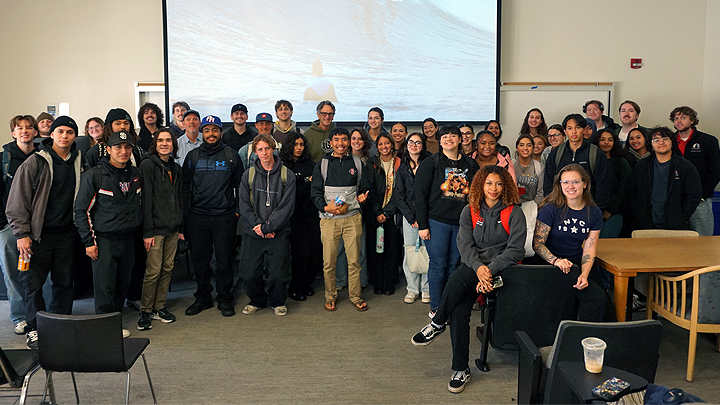Facing the Banality of Evil
At a summer seminar sponsored by the National Endowment for the Humanities, teachers explore the work of philosopher Hannah Arendt.

A conversation with political philosopher Hannah Arendt is bound to be challenging, unpredictable, wide-ranging and more than a little unsettling.
Just ask Kathleen Jones, professor emerita of women’s studies, who has conversed with Arendt on and off for most of Jones’ 24 years at San Diego State University.
Given that Arendt died in 1975, that may seem impossible, but in fact, her writings continue to engage academics and provoke debate about the perennially intriguing issues of authority, revolution, freedom, tradition and the modern age.
Arendt fled her native Germany in 1933. After some years in France, she was sent to a deportation camp, but escaped and ultimately reached the U.S. with the aid of the Varian Fry, an American who helped hundreds of Jews escape Europe as Nazi power expanded.
In her book, “Eichmann in Jerusalem,” about the Nazi official often called the architect of the Holocaust, Arendt coined the phrase “the banality of evil” to describe how ordinary people can be accomplices to evil by blindly following orders or conforming to the norms of a corrupt society.
Heroic events
This is the third summer Jones has invited a group of teachers to participate in the conversation with Arendt through a seminar entitled The Political Theory of Hannah Arendt: The Problem of Evil and the Origins of Totalitarianism.
Supported by a grant from the National Endowment for the Humanities, the six-week seminar attracts a diverse group of middle and high school educators from all parts of the country. Together they explore new ways of understanding the lessons of totalitarianism and the Holocaust, and the contemporary reverberations of these events in both personal and political life.
Visiting scholars add different perspectives to the mix. This summer, Jones invited three professors: Danielle Celermajer from the University of Sydney spoke on Arendt and human rights; Joanna Scott from Eastern Michigan University spoke on Arendt and the Christian philosopher Augustine; and Sandra Luft from San Francisco State University discussed Arendt’s Theory of Action.
“One thing Arendt brings home is that you are responsible for your actions,” said seminar participant Michael Scoblete, a New Jersey high school teacher. “Even in the worst of times, there are people who do the right thing. Students are looking for these heroic anecdotal events that say, ‘There is a role for you to be a human being.’”
Jones said she is “always impressed” by the teachers’ commitment to understanding and implementing Arendt’s political theories. Some have applied them to address bullying or intolerance at school; one North Carolina teacher created a website on Holocaust studies; a librarian incorporated the material into a program for incarcerated teens.
Part scholarship, part reflection
Jones’ interest in Arendt dates back to her graduate school days in New York. Later, as a women’s studies professor at SDSU, she returned to Arendt’s writing as source material for her own work on authority and gender.
But it wasn’t until one of Jones’ students was murdered by a boyfriend in 1994—and Jones pondered why ordinary people do terrible things—that she became “completely involved” with Arendt yet again.
She wrote “Living Between Danger and Love,” a personal reflection on the woman who was murdered, the man who murdered her and “how we share the burden for what happens in others’ lives by merely not thinking about our own lives and our connection to others.”
Jones’ new manuscript, “Occupying Hannah: A Thinking Journey with Hannah Arendt,” takes this insight deeper and (she hopes) will be published soon.
Back to NewsCenter



